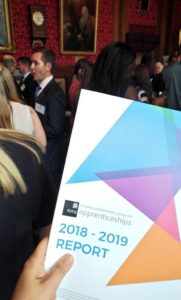
At the end of June, 140 people from 80+ organisations came together at Centrica’s Leicester offices to discuss the ways we can support young people overcoming barriers to work. Debbie Gordon – Head of Partnership Delivery at Movement to Work shares her thoughts following the event. It was a delight to join not my first, but second conference since being seconded to Movement to Work in December 2017 from Centrica. The event had brilliant guest speakers, the energy in the room was so positive and many new partnerships were forged. We’ve tried our best to summarise it in some key messages below, but if you’d like to know more about what we do, or see a copy of the presentations shared during the conference, please get in touch with Rachel at Movement to Work who will be happy to support you. Just click HERE
Key facts and stats from our annual MtW conference June 2018:
- There are still 500,000 young people who are economically inactive. James, our CEO, opened the event by sharing thoughts on the social mobility
challenge we face and how we must all focus to support young people further from the labour market including those that are economically inactive. Whilst youth unemployment has come down over the last five years, young people are still three-times more likely to be unemployed and little progress has been made to support those who are not at the Job Centre into the workplace. - There are less opportunities for young people to find ways into work. The data on Level 2 apprenticeships and work experience for young people who are NEET show a decline of 35%-53%
- Elaine Townshend from DWP, shared the latest employment statistics with us; we have record unemployment and record female employment. The ONS stats show that there are over 800,000 job vacancies at any one time, yet we are still seeing young people at a disadvantage. Elaine called on all employers to explore how they can do more to support a more diverse set of young people from across society into work and specifically asked them all to become disability confident.
- Elisabeth Paulson from Impetus shared with us their brilliant Youth Jobs Gap analysis which has some startling take aways:
- Disadvantaged Young People are twice as likely to be unemployed as their better off peers and this employment gap is consistent over time.
- While half this gap can be explained by differences in qualification, half cannot.
- Higher levels of qualifications are associated with lower NEET rates …and the proportion of low qualified young people who are NEET has barely changed in recent years, even though the proportion of young people with low qualification has fallen.
- At all levels of qualification, disadvantaged young people are more likely to be NEET than their better off peers with similar qualifications.
- Catherine Sezen from Association of Colleges shared with us the work they are doing and talked about the opportunity to collaborate to support those learners who are struggling to find alternative ways into employment and in-work learning.
- Finally, Linsay McCulloch from Mencap shared with us the challenges that face those with alearning disability; heart-breakingly 65% of them can and want to work and only 6% do. Linsay helped to bust some of the myths around supporting people with a learning disability into work as well as sharing the economic and social benefit and also offered Mencap’s support to any organisations who would like to do more in this space.
We were also lucky enough to be inspired by Ian ‘Woody’ Woodhouse from Enthuse International Ltd, who encouraged all attendees to make sure they themselves were fuelled for the journey ahead, as well as moving us to think creatively and to try and see situations from different perspectives.
Outside of the formal session, the space was arranged into over 20 stalls manned by training providers and youth outreach organisations, with attendees free to network to discuss topics of interest. We also had demonstrations on the use of the MtW Talent Portal by Get My First Job, the MtW Communications Platform by Meet and Engage, and Accenture’s Employability Skills Curriculum.
I’d like to say a big thank you to everyone for their support on the day and we’re sure that many more conversations are happening that can help thousands more young people across our network. If you haven’t already, please share your experiences on your social media channels, and make sure to tag @movementtowork and use the hashtags #YoungPeopleWork and #MtWConf2019. Please follow us on LinkedIn and Twitter.





 With a heavy heart my secondment to Movement to Work, leading our West Midlands Pilot alongside Rory Allbutt, has drawn to a close. The past six months have been a brilliant experience and it has been fantastic to be part of a collective Movement to help to change the lives of hundreds of young people in the West Midlands. In collaboration with West Midlands Combined Authority, DWP and our dedicated members across Movement to Work, we have made over 1,000 placements available for young people across 2019/20.
With a heavy heart my secondment to Movement to Work, leading our West Midlands Pilot alongside Rory Allbutt, has drawn to a close. The past six months have been a brilliant experience and it has been fantastic to be part of a collective Movement to help to change the lives of hundreds of young people in the West Midlands. In collaboration with West Midlands Combined Authority, DWP and our dedicated members across Movement to Work, we have made over 1,000 placements available for young people across 2019/20.
 We have had the pleasure of working with Matt Dronfield, Head of
We have had the pleasure of working with Matt Dronfield, Head of 
 James Ashall, CEO Movement to Work, attended the APPG on Apprenticeships for the launch of their annual report; here are his reflections on the case for change in the apprenticeships system.
James Ashall, CEO Movement to Work, attended the APPG on Apprenticeships for the launch of their annual report; here are his reflections on the case for change in the apprenticeships system.



